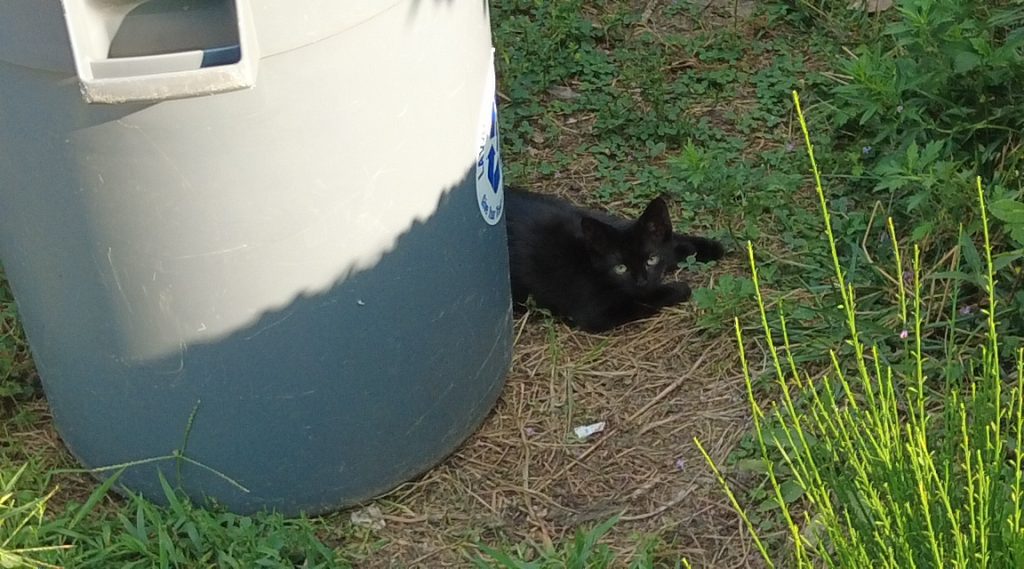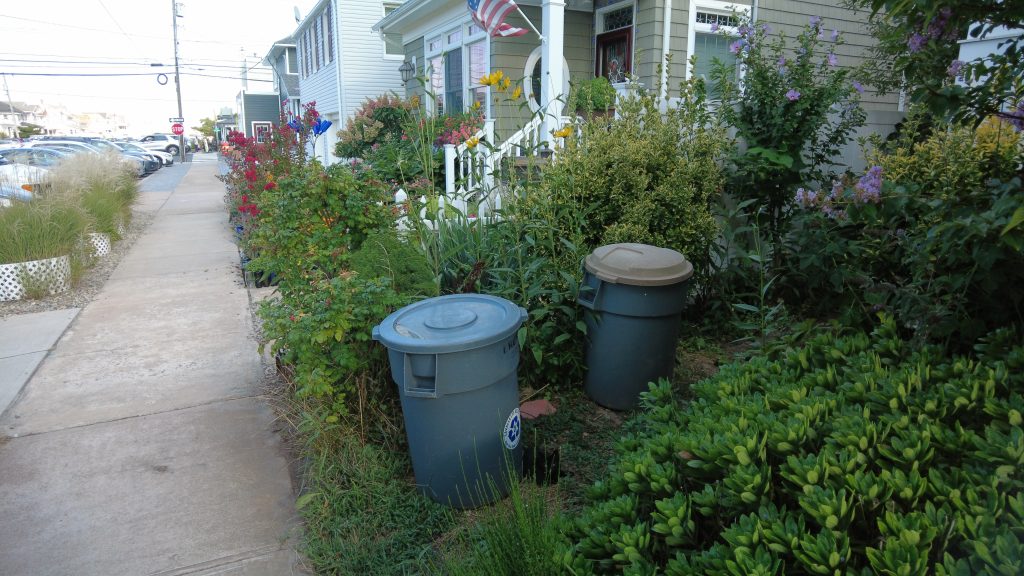
A small feral cat tucked behind a recycling can on the front yard of a home on President Avenue, Lavallette, Aug. 24, 2022. (Photo: Daniel Nee)
Lavallette officials will appoint a new animal control officer to begin 2023, ending a period of shared services between the borough and neighboring Seaside Heights which saw the latter town take over animal control efforts.
Residents, especially those on President Avenue, have been raising concern over the proliferation of feral cats for months. Over the summer, the cats multiplied to the point where some animals were being struck by cars on Route 35, urinating and defecating on outdoor furniture, and taking up residence in yards and on porches. Traps were purchased, but ultimately the borough found it necessary to seek a dedicated animal control officer for the town. The police department, consistent with state law, also has a designated humane law enforcement officer.
On several occasions, animal activists have – mainly from out of town – have come to Lavallette council meeting to implore borough officials not to send feral cats to shelters, where they may be euthanized. But through all of the meetings, there were no alternatives offered except the suggestion that the borough begin a “trap, neuter, release,” or TNR, program.
The issue was raised again Monday night.
“They’ll take them to the shelter and euthanize them after five days,” said Eileen Turner, a Newark Avenue resident, asking that the borough start a TNR program.
The problem faced by officials, however, is that despite the interest in the program, there does not seem to be anyone volunteering to run it or fund it. Under TNR, as its name implies, cats are trapped, neutered by a veterinarian and released back into the community where they can live out their lives without multiplying. The neuterings, however, come at a cost, and the program has proven controversial in some cities where volunteers were criticized for hosting cat “colonies” and feeding the feral animals after they had been released.
In Lavallette, with a tight budget year expected in 2023, there is no taxpayer-funded appropriation available for TNR, officials have said, and there has not been any success in attracting a volunteer to run the program.
“We’re looking for some community support to help with that program,” said Mayor Walter LaCicero. “The borough really doesn’t have the time, energy or money to be running a capture, neuter and release program. We were hoping somebody from the community would step up and say, ‘This is a worthy cause and we’d like to take that on.’ So far no one has done that.”

A small feral cat tucked behind a recycling can on the front yard of a home on President Avenue, Lavallette, Aug. 24, 2022. (Photo: Daniel Nee)
Lavallette, as a resort community, faces unique challenges in managing such a program. Many would-be volunteers are seasonal residents or snowbirds, and the population sees rapid changes depending on the time of year. Compounding the issue is the sad phenomenon of summer visitors leaving their cats behind in the fall, re-starting the cycle every year.
“The problem is finding somebody who’s a year-round resident who is willing to do this, and it’s hard,” said Councilman David Finter. “We go from 35,000 [residents] to 1,800.”
The entire issue of feral cats in the community is expected to be taken up again in January once the new animal control officer is appointed and completes training.
“It’s a problem for certain residents, and we’re going to take the steps we need to do in order to solve that problem,” LaCicero said. “In January we’re going to have our own animal control officer and we’re going to take the steps to have this resolved in the best way we can.”

Advertisement

Ortley Beach & North Beaches
Landmark Ortley Beach Breakfast Spot Looks to Expand

Ortley Beach & North Beaches
‘Temporary’ 70-Foot Cell Tower on Route 35 in Ocean Beach OK’d to Return

Seaside Heights & Seaside Park
Beloved South Seaside Park Restaurant Will Remain Open As Developer Seeks to Demolish Block

Seaside Heights & Seaside Park
In Seaside Heights, A $50M Flagship Building Rises Over the Boulevard in a Famed Location

Police, Fire & Courts
Ocean County Sheriff Establishes Drone Command Center in Seaside Heights Amid New Video





